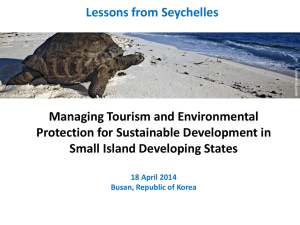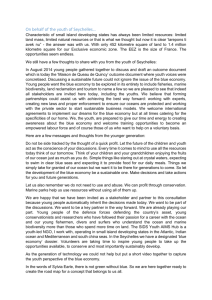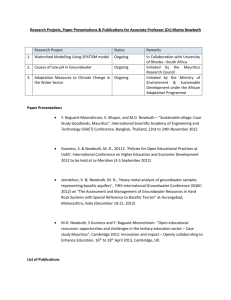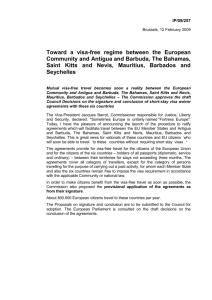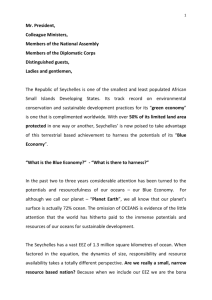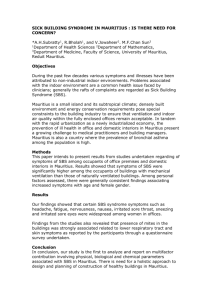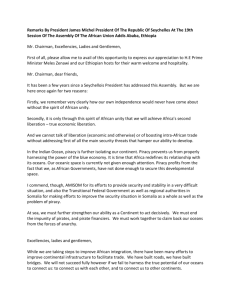RCAR 2012 Mauritius and Seychelles 11-01-13 v6 Final
advertisement
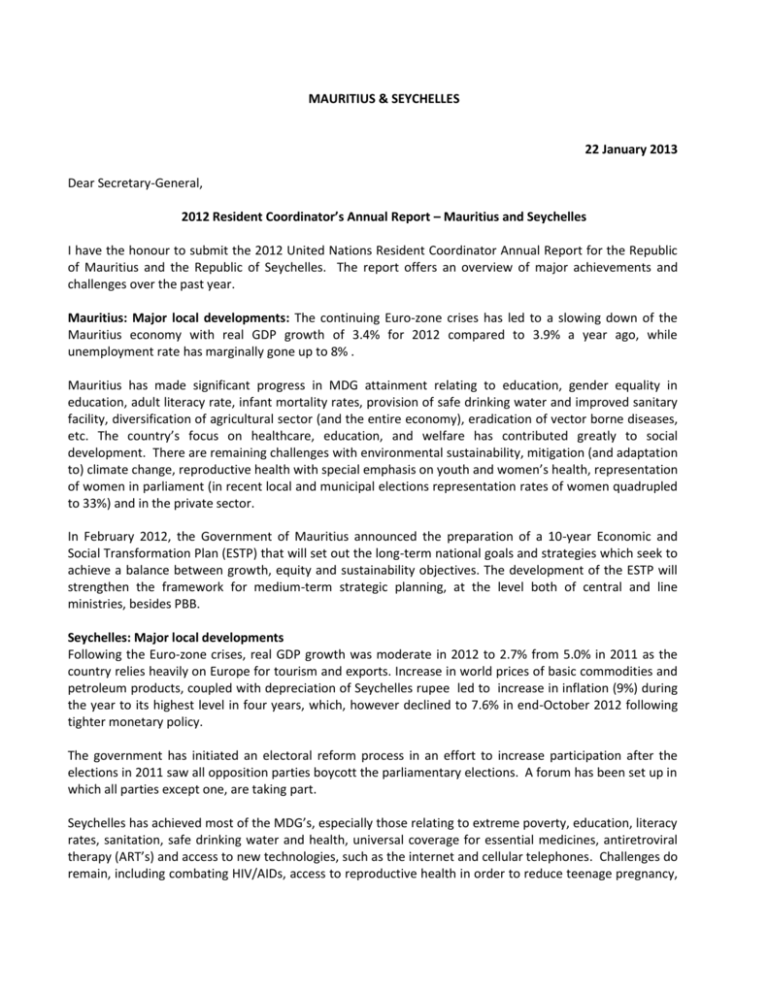
MAURITIUS & SEYCHELLES 22 January 2013 Dear Secretary-General, 2012 Resident Coordinator’s Annual Report – Mauritius and Seychelles I have the honour to submit the 2012 United Nations Resident Coordinator Annual Report for the Republic of Mauritius and the Republic of Seychelles. The report offers an overview of major achievements and challenges over the past year. Mauritius: Major local developments: The continuing Euro-zone crises has led to a slowing down of the Mauritius economy with real GDP growth of 3.4% for 2012 compared to 3.9% a year ago, while unemployment rate has marginally gone up to 8% . Mauritius has made significant progress in MDG attainment relating to education, gender equality in education, adult literacy rate, infant mortality rates, provision of safe drinking water and improved sanitary facility, diversification of agricultural sector (and the entire economy), eradication of vector borne diseases, etc. The country’s focus on healthcare, education, and welfare has contributed greatly to social development. There are remaining challenges with environmental sustainability, mitigation (and adaptation to) climate change, reproductive health with special emphasis on youth and women’s health, representation of women in parliament (in recent local and municipal elections representation rates of women quadrupled to 33%) and in the private sector. In February 2012, the Government of Mauritius announced the preparation of a 10-year Economic and Social Transformation Plan (ESTP) that will set out the long-term national goals and strategies which seek to achieve a balance between growth, equity and sustainability objectives. The development of the ESTP will strengthen the framework for medium-term strategic planning, at the level both of central and line ministries, besides PBB. Seychelles: Major local developments Following the Euro-zone crises, real GDP growth was moderate in 2012 to 2.7% from 5.0% in 2011 as the country relies heavily on Europe for tourism and exports. Increase in world prices of basic commodities and petroleum products, coupled with depreciation of Seychelles rupee led to increase in inflation (9%) during the year to its highest level in four years, which, however declined to 7.6% in end-October 2012 following tighter monetary policy. The government has initiated an electoral reform process in an effort to increase participation after the elections in 2011 saw all opposition parties boycott the parliamentary elections. A forum has been set up in which all parties except one, are taking part. Seychelles has achieved most of the MDG’s, especially those relating to extreme poverty, education, literacy rates, sanitation, safe drinking water and health, universal coverage for essential medicines, antiretroviral therapy (ART’s) and access to new technologies, such as the internet and cellular telephones. Challenges do remain, including combating HIV/AIDs, access to reproductive health in order to reduce teenage pregnancy, management of non-communicable diseases (especially cancer), weaknesses in education system, etc. Seychelles had a HDI ranking of 52 out of 187 in 2011, which was highest of all African nations. In spite of the laudable achievements, challenges persist as further economic liberalization leads to greater vulnerabilities. In a bid to reduce universal subsidies and move to a better-targeted social safety net program, the UN has been supporting the National Bureau of Statistics and the Agency for Social Protection to undertake an estimation of the poverty line and develop a poverty profile for Seychelles. The Medium Term National Development Strategy in Seychelles (2013-2016) is currently being finalised with the support of UN. With the completion of this, the development planning tools available will have significantly improved to aid strategic support to the government. Seychelles has been very active in anti-piracy and has been a venue for the trials of pirates over the course of 2012. Highlights on progress towards UNDAF outcomes in support to the national development priorities. This section should also demonstrate how UN reform has impacted UN common programming. Mauritius and Seychelles currently do not have an UNDAF and are working towards finalising a UN Common Framework of Assistance (CFA) for each country. The aim is to strategically target a selected number of thematic areas where joint UN technical assistance can have a high impact. Thematic Group leaders have been designated amongst the UNCT and draft work plans developed for Mauritius (in the areas of Education, Green Economy, Health and HIV/AIDS) and Seychelles (Health and HIV/AIDS only) until the end of 2013. These took the form of a Common Framework of Assistance (draft) for each country. The sectoral focuses agreed upon were HIV/AIDs, Green Economy, Health, Education, and Governance (with Gender and social inclusion as crosscutting). In line with the government strategy of sustainable development (MID), in 2011/2012, four studies were funded by ILO (Green Jobs Assessment, Skills for Green Jobs Study, Greening of Mauritian Study and Stocktaking Exercise on Trade Union Involvement/Activities in Green Jobs in Mauritius), on the potential for Green Growth in Mauritius - Green Jobs for MID. The recommendations of the studies on green jobs have been integrated in the draft MID Policy, strategy and action plan, which will be approved by Cabinet early 2013. Draft work plans for Health focused on NCDs and the areas identified are in line the 2011 Political Declaration of the High level Meeting of the General Assembly on Prevention and Control of NCDs (in particular reducing risk factors and scaling up health promoting environments; strengthening country level surveillance, monitoring systems and national health systems). The draft work plans in each DaO thematic areas require further agreement with national authorities and to be validated. However, even with the current limitations, it is important to recognise some of the highlights of the planned CFA Outcomes in relation to UN common programming, as they have been done in direct coordination and support of national plans. In Seychelles, the following UN agencies (WHO, UNHCHR, ILO, UNDP and WHO (Seychelles) worked on a joint proposal which was submitted to the newly established UN Partnership on the Rights of Persons with Disabilities (UNPRPD) to support the integration of persons with disabilities into mainstream society in Seychelles. Although the UNCT proposal was not approved, this provided the agencies with an opportunity to develop joint proposals on the specific interventions identified in the Common Framework of Assistance. A Green Economy Focal Point came into post in August 2012, funded by ILO, UNDP, and UNIDO. The FP has been working in close cooperation with ILO, UNIDO, UNDP, and UNEP to elaborate future joint programming plans and has been assisting in resource mobilization with UN Agencies as well as donor organizations for the implementation of Maurice Ile Durable and the draft Medium Term National Development Strategy for Seychelles. The HIV/AIDs Focal Point in Mauritius (until March 2012) has actively participated in the elaboration of the new National Strategic Framework 2012-2016. The framework has a special focus on Rodrigues. The RCO supported the mission of a technical team from the National Aids Secretariat to Rodrigues in this respect. The RCO facilitated mobilization of Technical Assistance from the UNAIDS Inter-Country Office and the Regional Support Team during the whole process of developing the NSF (Gender mainstreaming, RBM training to the stakeholders working group and the national partnership forum, Monitoring and Evaluation Strategy etc). Technical Assistance from WHO Inter-country Support Team was also mobilised to review the draft NSF 2012-2016 developed by the Technical Working Groups; and build capacity of the National Steering Committee and Technical Working Groups to develop the Business Plan of the National Framework. In Seychelles, following the departure of the HIV and AIDS Technical Advisor in February, UNFPA supported a UNV until October 2012 with WHO oversight. RCO managed to mobilize funds from the RSC to extend the contract of the UNV up to end April 2013, who is undertaking an instrumental assessment of the legal environment in Seychelles. A joint Gender Program has been initiated by UN Women and UNDP, including the funding of a Gender Focal Point in the Resident Coordinators Office. The development and elaboration of the Seychelles Medium Term National Development Strategy has been supported with joint funding from UNDP, UNESCO, ILO, and RCO. Rodrigues was a special focus of the UNCT in 2012. A set of concept notes was elaborated with the Rodrigues Regional Assembly with support of the DaO Focal Point. A case study on UN Coordination in Rodrigues has also been developed, learning from this pilot will be used by the UNCT in 2013. Focal Points based within the RC Office are being appointed to lead on Green Economy (in post), Gender (in post January 2013), HIV/AIDs (vacant in Mauritius but a FP in Seychelles), Rodrigues DaO (newly vacant). It has also been agreed with the Seychelles MFA to cost share a Coordination Assistant in Seychelles. Highlights on progress in UN reform In 2012, there were substantial changes in the RCO for Mauritius and Seychelles, including substantive turnover in every post except one. Even with these significant personnel changes, the UNCT for Mauritius and Seychelles has made substantial progress on delivering in a more coordinated fashion across agencies. There is substantial commitment to continue this improvement of ways of working as to how the UNCT cooperates, coordinates, communicates, and programmes in Mauritius and Seychelles. The UNCT piloted the Delivering as One Compact in Rodrigues that has had some considerable success. The President of Seychelles made a formal request to the UN Secretary General in April 2012 requesting inclusion in the DaO process. The proposed DaO plan of developing a UN Common Framework of Assistance (UN CFA) for each country has moved forward, though has not yet been finalised. UNCT cost shared posts of thematic Focal Points in the RC’s Office has moved forward as well, but the blockages of the last 18 months largely remain. Recruitment for these posts remain a challenge, but where the posts have been filled (two out of four) there has been significantly improved coordination and strategic planning. Given the 15 NRA to two (2) resident agency ratio, these posts are crucial to the effectiveness of the RC’s Office (and to lessen the burden on our development partners and government). (i) Efforts to align with the national development processes; The UN has continued its support to advancing the Programme Based Budgeting (with performance indicators) and the start of the 10-year Economic and Social Transformation Plan (ESTP) in Mauritius and the to the Medium Term National Development Strategy in Seychelles (2013-2016); the development planning tools now available have significantly improve to aid strategic support to the government. These strategic documents are being used as the basis for formulation new technical cooperation programmes for the two countries. All UN Agencies have concluded (or are in the process of formulating) detailed separate Country Programme Framework (CPF), or similar, with the two countries. The CPFs define mutually agreed priority development needs in various sectors that could be addressed through technical cooperation activities between the Governments and the UN Agencies. These now will need to be more holistically aligned to the new national planning tools being developed. (ii) Support to the national government in the advancing the achievement of the Millennium Declaration/MDGs; Both countries have made significant achievements on MDG’s and Mauritius was selected as a Post 2015 consultation country. Each of the UN Agencies operating in the two countries implemented successful projects that made significant contributions toward the achievements of the various MDGs. The RCO is working in close collaboration with the MFA to undertake the Post 2015 national consultation process. (iii) Progress UNCTs are making collectively in support of the national partners’ endeavors towards capacity development and aid effectiveness The RC has taken a proactive role in working with Development Partners to better coordinate and align programs. This has been possible through increased program communications with the UNCT, mapping of program activities and the provision of technical support. (iv) Experiences of common programming, including HACT UNDP and WHO consolidated their shared common services which includes office rental and IT support services. UNDP is managing the contracts. (v) Other highlights in coordination A number of UN Agencies (IAEA, OCHA, UNDP, GEF SGP, UNEP, FAO) have continued to assist the two countries in formulation and implementation of strategies and measures for emergency preparedness, climate change mitigation and adaptation as well as energy, environmental and biodiversity issues. In Mauritius, this includes drafting the Climate Change Bill and setting up the Energy Efficiency Management Office (EMMO) following the enactment of the Energy Efficiency Act. In Seychelles, this support includes reviewing the national disaster risk management policy and other policy documents, including the draft Disaster Bill. In both countries substantial work is being undertaken on biodiversity protection. In line with its policy on economic growth, the Government of Mauritius endorsed and signed the Decent Work Country Program, in November 2012. The program contributes to the national policy with the aim to improving the employment of working and living conditions of workers in Mauritius. In line with its policy for the development of the Agriculture sector, the Government of Mauritius conducted with FAO a new Census of Agriculture to provide up-to-date and comprehensive data on the agricultural sector for planning and policy making. Mauritius successfully elaborated a National Urban Profile under the first phase of the Participatory Slum Upgrading Project (PSUP) in collaboration with UN-Habitat, UNDP, EC and the ACP Secretariat. The process was done in a participatory manner comprising relevant Ministries and Urban Councils as well as representatives of the civil society, private sector and academia. The key aspects of the proposed 2013 workplan and linkages to ongoing issues of concern within the country Finalize the recruitment and financing for all of the Focal Points in the RC Office. These include; Green Economy, Gender, HIV/AIDs, Rodrigues DaO, and Coordination Assistant (Seychelles) Finalize UN Common Framework of Assistance for both countries for the period 2013-2016, through a national dialogue process with government Move Rodrigues DaO initiatives out of pilot phase and into normal ways of working Increase outreach to NRAs to increase program impact, this would include evidence based policy and program options supporting the real needs in Mauritius and Seychelles (e.g. the myth of MICs not requiring as much technical assistance leading to diminishing program budgets) RC Office funding and financing strategy developed Recommendations, if any, for changes in policies, rules and regulations. Support in developing financing strategies for coordination in MIC countries, particularly those that have a very high ratio of NRA's. This would also be true for RCO's with multi-country responsibility. This would include policy options for Resident Coordinator Office financing by resident and non-resident agencies. Reviewing how DaO can meet the required criteria and end states, but in a way that can be done with limited transaction costs of "lite".
